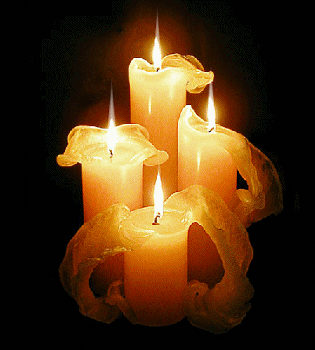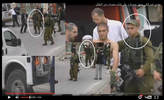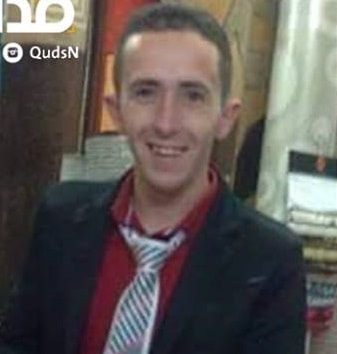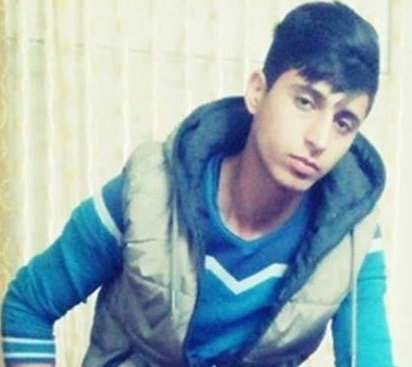4 jan 2017

Some 400 protesters swarm onto Kaplan Street, blocking the road temporarily and clashing with police; at least four protesters arrested; some supporters incite against IDF chief, chanting 'Gadi, Gadi beware, Rabin's looking for a friend.'
Some 400 protesters rioted and clashed with police outside the Kirya IDF headquarters in Tel Aviv on Wednesday both before and after Sgt. Elor Azaria was convicted of manslaughter after shooting dead a seriously wounded terrorist in Hebron.
At least four of the protesters were arrested for disrupting the peace, with one also being suspected of attacking a police officer.
Protesters, some of them masked, included members of the far right-wing Lahava group, Beitar Jerusalem soccer fans, and members of the criminal, soccer fan group La Familia.
The protesters ran onto the road on Kaplan Street outside the Kirya's main entrance, blocking it temporarily in both directions.
Several of the protesters incited against the IDF chief of staff, Gadi Eisenkot.
Channel 2 aired footage of some protesters chanting "Gadi, Gadi beware, Rabin's looking for a friend," referring to the Israeli prime minister who was assassinated.
They also confronted with police officers who were trying to take away the support signs they brought with them, while every piece of information coming out of the courtroom led to shouting and shoving, with protesters pushing the barriers put by police.
Some 400 protesters rioted and clashed with police outside the Kirya IDF headquarters in Tel Aviv on Wednesday both before and after Sgt. Elor Azaria was convicted of manslaughter after shooting dead a seriously wounded terrorist in Hebron.
At least four of the protesters were arrested for disrupting the peace, with one also being suspected of attacking a police officer.
Protesters, some of them masked, included members of the far right-wing Lahava group, Beitar Jerusalem soccer fans, and members of the criminal, soccer fan group La Familia.
The protesters ran onto the road on Kaplan Street outside the Kirya's main entrance, blocking it temporarily in both directions.
Several of the protesters incited against the IDF chief of staff, Gadi Eisenkot.
Channel 2 aired footage of some protesters chanting "Gadi, Gadi beware, Rabin's looking for a friend," referring to the Israeli prime minister who was assassinated.
They also confronted with police officers who were trying to take away the support signs they brought with them, while every piece of information coming out of the courtroom led to shouting and shoving, with protesters pushing the barriers put by police.
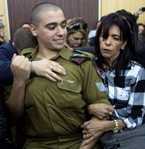
An Israeli soldier filmed shooting dead a wounded Palestinian protester after he had been disarmed of a knife has been convicted of manslaughter.
Elor Azaria, 20, fatally shot Abdul Fatah al-Sharif, 21, in the head while he was lying immobile on a road.
In their indictment, prosecutors said Azaria "violated the rules of engagement without operational justification as the youth was lying on the ground wounded and represented no immediate threat for the accused or others who were present".
Delivering the verdict on Wednesday, the panel of three military judges rejected Azaria's defense that he shot Sharif because he continued to pose a threat.
The judges also said there was no dispute regarding the veracity of the statements made by another soldier, who testified to military investigators that Azaria had told him during the incident: "They stabbed my friend and tried to kill him - he deserves to die."
Azaria told the court that he did not recall having any such conversation.
The judges also accepted the findings of a post-mortem examination, which concluded that it was the single bullet to the head that killed Sharif.
The March 24 shooting of Fatah al-Sharif, 21, as he lay overpowered on the ground was filmed by activists from the Israeli B'Tselem human rights group.
Al-Sharif and another Palestinian his age were shot as they allegedly lunged at an Israeli soldier in the southern occupied West Bank province of al-Khalil.
Footage of the scene several minutes later, released by the Israeli human rights group B'Tselem, shows Sharif alive.
In the video, a combat medic, later identified as Azaria, raises and aims his rifle, then a shot is heard. The Palestinian's head jolts and he suddenly has a serious head wound.
Human Rights Watch said on Monday that there had been more than 150 instances since October 2015 in which Israeli occupation forces fatally shot Palestinian adults and children while they posed no threat to the occupation officers.
Elor Azaria, 20, fatally shot Abdul Fatah al-Sharif, 21, in the head while he was lying immobile on a road.
In their indictment, prosecutors said Azaria "violated the rules of engagement without operational justification as the youth was lying on the ground wounded and represented no immediate threat for the accused or others who were present".
Delivering the verdict on Wednesday, the panel of three military judges rejected Azaria's defense that he shot Sharif because he continued to pose a threat.
The judges also said there was no dispute regarding the veracity of the statements made by another soldier, who testified to military investigators that Azaria had told him during the incident: "They stabbed my friend and tried to kill him - he deserves to die."
Azaria told the court that he did not recall having any such conversation.
The judges also accepted the findings of a post-mortem examination, which concluded that it was the single bullet to the head that killed Sharif.
The March 24 shooting of Fatah al-Sharif, 21, as he lay overpowered on the ground was filmed by activists from the Israeli B'Tselem human rights group.
Al-Sharif and another Palestinian his age were shot as they allegedly lunged at an Israeli soldier in the southern occupied West Bank province of al-Khalil.
Footage of the scene several minutes later, released by the Israeli human rights group B'Tselem, shows Sharif alive.
In the video, a combat medic, later identified as Azaria, raises and aims his rifle, then a shot is heard. The Palestinian's head jolts and he suddenly has a serious head wound.
Human Rights Watch said on Monday that there had been more than 150 instances since October 2015 in which Israeli occupation forces fatally shot Palestinian adults and children while they posed no threat to the occupation officers.

Court to determine whether to convict Sgt. Elor Azaria, who shot dead a seriously wounded terrorist in Hebron, of manslaughter or of a less grave offense, such as forbidden or negligent use of a firearm; if convicted, he could face several years in prison; defense team say will appeal if convicted.
The military court will hand down its ruling in the trial of Sgt. Elor Azaria, who faces manslaughter charges after shooting dead a seriously wounded terrorist in Hebron last year.
If Azaria is found guilty of manslaughter, he will be sentenced in about a month, and could face several years in prison.
Central Command Chief Justice Col. Maya Heller will read out the verdict at 10am at the special military court at the Kirya IDF headquarters in Tel Aviv.
The court hearings have so far taken place at the Jaffa military court, but due to explosive nature of the hearing it was moved to the Kirya and will be held under tight security. Azaria's supporters, who have been protesting outside the Jaffa court throughout the trial, will be outside the base's gates and far from the courtroom. Only authorized personnel and the soldier's family members will be allowed into the courtroom.
The judges might choose to convict the soldier of a less grave offense, such as forbidden or negligent use of a firearm.
The Military Advocate General's Office has been considering asking the court to send Azaria to prison immediately if he is convicted of manslaughter and not wait for the sentencing.
Azaria has spent the nine months of the trial under open detention at his brigade's base near Rosh HaAyin, where he has been doing maintenance work.
Sources close to the soldier who spoke to him in recent days claim he sounds "strong and optimistic and is not showing signs of breaking."
These sources did express concern of the fact that the judges, particularly Judge Heller, have shown little patience towards Azaria and the defense's witnesses during the trial.
Azaria's lawyers, Eyal Beserglick and Ilan Katz, attacked prosecutor Lt. Col. Nadav Weisman and the Chief Military Advocate General Brig. Gen. Sharon Afek in a letter to Defense Minister Avigdor Lieberman on Monday, in which they demanded to ensure the IDF's top command has no influence on the trial.
An acquittal could cause a crisis of trust towards the chain of command in the IDF that has been condemning Azaria's actions clearly and in no uncertain terms since the incident.
In the case of conviction, right-wing politicians are expected to call for a lenient sentence.
Meanwhile, Azaria's defense team said they intend to appeal a conviction at the military court of appeals. This could drag the trial out for at least four more months and even longer if another appeal is filed to the Supreme Court.
The military court will hand down its ruling in the trial of Sgt. Elor Azaria, who faces manslaughter charges after shooting dead a seriously wounded terrorist in Hebron last year.
If Azaria is found guilty of manslaughter, he will be sentenced in about a month, and could face several years in prison.
Central Command Chief Justice Col. Maya Heller will read out the verdict at 10am at the special military court at the Kirya IDF headquarters in Tel Aviv.
The court hearings have so far taken place at the Jaffa military court, but due to explosive nature of the hearing it was moved to the Kirya and will be held under tight security. Azaria's supporters, who have been protesting outside the Jaffa court throughout the trial, will be outside the base's gates and far from the courtroom. Only authorized personnel and the soldier's family members will be allowed into the courtroom.
The judges might choose to convict the soldier of a less grave offense, such as forbidden or negligent use of a firearm.
The Military Advocate General's Office has been considering asking the court to send Azaria to prison immediately if he is convicted of manslaughter and not wait for the sentencing.
Azaria has spent the nine months of the trial under open detention at his brigade's base near Rosh HaAyin, where he has been doing maintenance work.
Sources close to the soldier who spoke to him in recent days claim he sounds "strong and optimistic and is not showing signs of breaking."
These sources did express concern of the fact that the judges, particularly Judge Heller, have shown little patience towards Azaria and the defense's witnesses during the trial.
Azaria's lawyers, Eyal Beserglick and Ilan Katz, attacked prosecutor Lt. Col. Nadav Weisman and the Chief Military Advocate General Brig. Gen. Sharon Afek in a letter to Defense Minister Avigdor Lieberman on Monday, in which they demanded to ensure the IDF's top command has no influence on the trial.
An acquittal could cause a crisis of trust towards the chain of command in the IDF that has been condemning Azaria's actions clearly and in no uncertain terms since the incident.
In the case of conviction, right-wing politicians are expected to call for a lenient sentence.
Meanwhile, Azaria's defense team said they intend to appeal a conviction at the military court of appeals. This could drag the trial out for at least four more months and even longer if another appeal is filed to the Supreme Court.
3 jan 2017
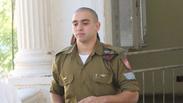
Advocacy group Yesh Din says that the IDF is not doing enough to investigate crimes committed by Israeli soldiers against Palestinians; report's release comes a day before verdict in Elor Azaria trial.
Israeli advocacy group Yesh Din criticized what it called an "exceptionally low" prosecution rate by the Israeli military in cases of violence committed by soldiers against Palestinians on Tuesday.
Yesh Din, a human rights group that is often critical of the Israeli military, issued the report a day before a military court's verdict is to be delivered in a high-profile manslaughter case against a soldier.
In its annual report, Yesh Din said the army opened 186 criminal investigations into suspected offenses against Palestinians in 2015, but just four of those investigations yielded indictments. The group said the 2015 figures, based on official army data, were the most recent available.
In the fall of 2015, a wave of Israeli-Palestinian violence erupted, characterized by Palestinian stabbing and car-ramming attacks on Israelis. The report said that of 76 Palestinians killed in clashes with soldiers in the West Bank in 2015, only 21 deaths resulted in investigations.
"The fact that in 55 incidents no criminal investigation was considered necessary raises doubts about the implementation of Israel's declared policy on investigating civilian fatalities," the report said. It said the data signaled an "inability and unwillingness" to address unlawful conduct.
The Israeli military did not respond to requests for comment.
On Wednesday, a military court is to deliver its verdict in the manslaughter case of a soldier who was caught on video last March fatally shooting an incapacitated Palestinian attacker in the West Bank. The case of Sgt. Elor Azaria, who has argued that attacker still posed a threat, has deeply divided Israel.
Yesh Din spokesman Gilad Grossman said the manslaughter charge against a soldier was "very rare," but that the public uproar sparked by the video made it impossible to ignore.
"There was no way to look aside and not investigate," he said.
Israeli advocacy group Yesh Din criticized what it called an "exceptionally low" prosecution rate by the Israeli military in cases of violence committed by soldiers against Palestinians on Tuesday.
Yesh Din, a human rights group that is often critical of the Israeli military, issued the report a day before a military court's verdict is to be delivered in a high-profile manslaughter case against a soldier.
In its annual report, Yesh Din said the army opened 186 criminal investigations into suspected offenses against Palestinians in 2015, but just four of those investigations yielded indictments. The group said the 2015 figures, based on official army data, were the most recent available.
In the fall of 2015, a wave of Israeli-Palestinian violence erupted, characterized by Palestinian stabbing and car-ramming attacks on Israelis. The report said that of 76 Palestinians killed in clashes with soldiers in the West Bank in 2015, only 21 deaths resulted in investigations.
"The fact that in 55 incidents no criminal investigation was considered necessary raises doubts about the implementation of Israel's declared policy on investigating civilian fatalities," the report said. It said the data signaled an "inability and unwillingness" to address unlawful conduct.
The Israeli military did not respond to requests for comment.
On Wednesday, a military court is to deliver its verdict in the manslaughter case of a soldier who was caught on video last March fatally shooting an incapacitated Palestinian attacker in the West Bank. The case of Sgt. Elor Azaria, who has argued that attacker still posed a threat, has deeply divided Israel.
Yesh Din spokesman Gilad Grossman said the manslaughter charge against a soldier was "very rare," but that the public uproar sparked by the video made it impossible to ignore.
"There was no way to look aside and not investigate," he said.
30 dec 2016
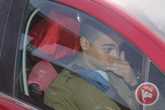
Elor Azarya, the Israeli soldier facing manslaughter charges for shooting a Palestinian to death who was immobilized on the ground in Hebron in March, was released to his home on Friday for a “short break” from his detention.
According to Israeli newspaper Arutz Sheva, Azarya’s father Charlie took him home Friday morning for a break that would last until Sunday. The final verdict on the case is expected to follow shortly after.
Azarya, 19, has been in “open detention” at an Israeli military base since April, where he is free to roam and has received visits from his family.
Spokesman for the Azarya family Ran Karmi Bozaglo was quoted by Arutz Sheva as saying that “Elor was released for a short break, on the eve of the deliberations at which the verdict for his case will be announced."
"It is of note that limitations and conditions have been imposed on the break, including that he is forbidden from leaving his home, something which implies house arrest.”
“The members of the family believe and hope that soon the Army will return to them the son whom they sent to guard the homeland. The family requests that the public respect its privacy and allow them to best utilize the short time allotted to share with their son,” he added.
As the case drew to a close, Azarya's defense team last month called for the soldier to be exonerated of all charges for shooting 21-year-old Abd al-Fatah al-Sharif at point-blank range after the Palestinian had already been shot and severely wounded for allegedly attempting to stab another Israeli soldier.
Azarya’s lawyers argued that the trial had confirmed the soldier’s version of events, which stated that Azarya shot al-Sharif because he believed the immobilized man could have reached for a knife or had been concealing explosive underneath his jacket.
However, Azarya’s version has been thoroughly contradicted during the duration of the trial by his commanders and experts, who stated that al-Sharif did not constitute a threat at the time of his death, and that him wearing a jacket was not suspicious given the weather that day.
Weeks into Azarya’s trial, reports emerged that the second Palestinian killed alongside al-Sharif was also shot in the head execution style. However, no trial has been opened in the case.
Earlier this month, soldiers in Azarya’s battalion reportedly said they will go “AWOL” or even desert should their fellow combatant be convicted of manslaughter charges by the military court, and large numbers of Israeli citizens have also come out in support of the soldier.
On Wednesday, former Israeli Defense Minister Moshe Yaalon criticized Israeli Prime Minister Benjamin Netanyahu for his support of the Azaryas, which Yaalon said came after Israeli politicians “saw an opportunity, decided to declare the soldier a hero and started spreading rumors against the prime minister, against me, and against the (Israeli army).”
“Later, sadly, the prime minister switched sides and decided to embrace the soldier and his family,” he said.
Shortly after Yaalon in May urged Israeli officers to speak out against the “extremist minority” who he said were working to undermine the values of Israel’s military, Netanyahu replaced him with far-right Avigdor Lieberman as the new defense minister, who has since publicly supported Azarya.
“We don’t just shoot at people,” Yaalon said Wedneday, “not even if he’s a terrorist, not even at another soldier who just shot at you but has now surrendered and has been neutralized, we don’t just shoot.”
"If we don’t come out very clearly against this, that we denounce it, this behavior, then the Palestinians will accuse us -- as they have for a long time -- of committing extra-judicial killings."
The high-profile case has indeed drew unprecedented international condemnation toward the Israeli army, after a video clip was immediately released showing the brutal killing.
Amnesty International said that al-Sharif's killing mirrored a number of incidents which had taken place previously and that “Israeli forces have a long history of carrying out unlawful killings -- including extrajudicial executions -- in the occupied Palestinian territories with impunity."
"While it is encouraging that the soldier in the video has reportedly been suspended and placed under investigation, previous Israeli investigations have failed to hold members of the Israeli forces accountable even when there has been clear evidence of criminal wrongdoing."
Israeli rights group B’Tselem has accused Israeli soldiers and police officers of acting as “judge, jury and executioner” for Palestinians during the past few months of unrest, also blaming official encouragement and effective impunity for Israeli soldiers who are rarely held accountable for their excessive, and often lethal, use of force against Palestinians.
According to Israeli newspaper Arutz Sheva, Azarya’s father Charlie took him home Friday morning for a break that would last until Sunday. The final verdict on the case is expected to follow shortly after.
Azarya, 19, has been in “open detention” at an Israeli military base since April, where he is free to roam and has received visits from his family.
Spokesman for the Azarya family Ran Karmi Bozaglo was quoted by Arutz Sheva as saying that “Elor was released for a short break, on the eve of the deliberations at which the verdict for his case will be announced."
"It is of note that limitations and conditions have been imposed on the break, including that he is forbidden from leaving his home, something which implies house arrest.”
“The members of the family believe and hope that soon the Army will return to them the son whom they sent to guard the homeland. The family requests that the public respect its privacy and allow them to best utilize the short time allotted to share with their son,” he added.
As the case drew to a close, Azarya's defense team last month called for the soldier to be exonerated of all charges for shooting 21-year-old Abd al-Fatah al-Sharif at point-blank range after the Palestinian had already been shot and severely wounded for allegedly attempting to stab another Israeli soldier.
Azarya’s lawyers argued that the trial had confirmed the soldier’s version of events, which stated that Azarya shot al-Sharif because he believed the immobilized man could have reached for a knife or had been concealing explosive underneath his jacket.
However, Azarya’s version has been thoroughly contradicted during the duration of the trial by his commanders and experts, who stated that al-Sharif did not constitute a threat at the time of his death, and that him wearing a jacket was not suspicious given the weather that day.
Weeks into Azarya’s trial, reports emerged that the second Palestinian killed alongside al-Sharif was also shot in the head execution style. However, no trial has been opened in the case.
Earlier this month, soldiers in Azarya’s battalion reportedly said they will go “AWOL” or even desert should their fellow combatant be convicted of manslaughter charges by the military court, and large numbers of Israeli citizens have also come out in support of the soldier.
On Wednesday, former Israeli Defense Minister Moshe Yaalon criticized Israeli Prime Minister Benjamin Netanyahu for his support of the Azaryas, which Yaalon said came after Israeli politicians “saw an opportunity, decided to declare the soldier a hero and started spreading rumors against the prime minister, against me, and against the (Israeli army).”
“Later, sadly, the prime minister switched sides and decided to embrace the soldier and his family,” he said.
Shortly after Yaalon in May urged Israeli officers to speak out against the “extremist minority” who he said were working to undermine the values of Israel’s military, Netanyahu replaced him with far-right Avigdor Lieberman as the new defense minister, who has since publicly supported Azarya.
“We don’t just shoot at people,” Yaalon said Wedneday, “not even if he’s a terrorist, not even at another soldier who just shot at you but has now surrendered and has been neutralized, we don’t just shoot.”
"If we don’t come out very clearly against this, that we denounce it, this behavior, then the Palestinians will accuse us -- as they have for a long time -- of committing extra-judicial killings."
The high-profile case has indeed drew unprecedented international condemnation toward the Israeli army, after a video clip was immediately released showing the brutal killing.
Amnesty International said that al-Sharif's killing mirrored a number of incidents which had taken place previously and that “Israeli forces have a long history of carrying out unlawful killings -- including extrajudicial executions -- in the occupied Palestinian territories with impunity."
"While it is encouraging that the soldier in the video has reportedly been suspended and placed under investigation, previous Israeli investigations have failed to hold members of the Israeli forces accountable even when there has been clear evidence of criminal wrongdoing."
Israeli rights group B’Tselem has accused Israeli soldiers and police officers of acting as “judge, jury and executioner” for Palestinians during the past few months of unrest, also blaming official encouragement and effective impunity for Israeli soldiers who are rarely held accountable for their excessive, and often lethal, use of force against Palestinians.
13 dec 2016
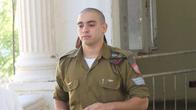
The IDF chief of staff says soldiers aren't hesitating to draw their weapons when required since trial began; he boasts of female soldiers in retort to recent comments opposing female combat soldiers.
"No one judges a soldier to look good in someone else's eyes, but rather to protect the IDF and its values," said IDF Chief of Staff Gadi Eisenkot during a meeting with students with in Acre in reference to the trial of Sgt. Elor Azaria.
Azaria's trial recently concluded after he was charged of manslaughter for shooting and killing a seriously wounded Palestinian terrorist in March.
Eisenkot said, "We have professional requirements and norms we expect from our soldiers, and when commanders think that something happens that deviates from the norm, they take a position. If we didn't do this, we wouldn't be able to be able to give soldiers guns and expect them to use them."
He went on to say that he was supporting Azaria's commanders and that he had faith in the integrity of the military courts. According to Eisenkot, the incident did not negatively impact the motivation of soldiers serving in the IDF: "I have seen since then hundreds of soldiers and incidents and I discerned no harm caused to their motivation or to their willingness to draw their weapons and shoot whomever they need to shoot."
Commenting on the recent statements made by rabbis and IDF officials opposing female enlistment into IDF combat units, Eisenkot responded: "We have female fighter pilots endowed with great talent, female commanders who serve as ship commanders in the navy, seven security battalions containing female soldiers who stand with courage against challenges posed by men," he retorted proudly.
"We are now seeing record numbers of women serving as senior officers since the establishment of the IDF and are undertaking efforts to widen the participation of women. We are a nation that has a religious population, and we also need to cater for a religious soldier who doesn't want to serve in a co-ed unit, but all the shouting is needless because today there is an option for religious soldiers who don't want to serve in a co-ed unit and can serve in another unit," he added.
Regarding the allegations of sexual assault against Brig. Gen. Ofek Buchris, Eisenkot commented, "I say—as a commander and as a father to daughters with sensitivity to human dignity—that these incidents are handled with an iron first. In the case of Ofek Buchris, a firm and correct hand was used: He was suspended from the IDF and dismissed from his position. In general, I view exploiting a position of authority poorly, even if nobody complains."
"No one judges a soldier to look good in someone else's eyes, but rather to protect the IDF and its values," said IDF Chief of Staff Gadi Eisenkot during a meeting with students with in Acre in reference to the trial of Sgt. Elor Azaria.
Azaria's trial recently concluded after he was charged of manslaughter for shooting and killing a seriously wounded Palestinian terrorist in March.
Eisenkot said, "We have professional requirements and norms we expect from our soldiers, and when commanders think that something happens that deviates from the norm, they take a position. If we didn't do this, we wouldn't be able to be able to give soldiers guns and expect them to use them."
He went on to say that he was supporting Azaria's commanders and that he had faith in the integrity of the military courts. According to Eisenkot, the incident did not negatively impact the motivation of soldiers serving in the IDF: "I have seen since then hundreds of soldiers and incidents and I discerned no harm caused to their motivation or to their willingness to draw their weapons and shoot whomever they need to shoot."
Commenting on the recent statements made by rabbis and IDF officials opposing female enlistment into IDF combat units, Eisenkot responded: "We have female fighter pilots endowed with great talent, female commanders who serve as ship commanders in the navy, seven security battalions containing female soldiers who stand with courage against challenges posed by men," he retorted proudly.
"We are now seeing record numbers of women serving as senior officers since the establishment of the IDF and are undertaking efforts to widen the participation of women. We are a nation that has a religious population, and we also need to cater for a religious soldier who doesn't want to serve in a co-ed unit, but all the shouting is needless because today there is an option for religious soldiers who don't want to serve in a co-ed unit and can serve in another unit," he added.
Regarding the allegations of sexual assault against Brig. Gen. Ofek Buchris, Eisenkot commented, "I say—as a commander and as a father to daughters with sensitivity to human dignity—that these incidents are handled with an iron first. In the case of Ofek Buchris, a firm and correct hand was used: He was suspended from the IDF and dismissed from his position. In general, I view exploiting a position of authority poorly, even if nobody complains."
24 nov 2016
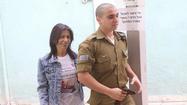
Sgt. Elor Azaria with his mother
As court hears the final speeches from the defense and prosecution teams, defense attorney insists 'he feared a bona fide threat,' accuses Ya'alon of rocking the state by issuing premature judgments of his client; prosecution says defendant should be given no quarter: 'He told lie after lie after lie. There was no consistency in his testimony.'
The trial of Sgt. Elor Azaria reached its conclusion Wednesday afternoon at a special military court in Jaffa during which the prosecution and defense teams delivered their final appeals.
Azaria is facing manslaughter charges after he shot to death a seriously wounded Palestinian terrorist, Abed al Fatah al-Sharif, in Hebron in March
During the final session military prosecutor Lt. Col. Nadav Weisman sought to undermine the credibility of the defendant, reiterating previous points in which he accused Azaria of repeatedly lying during his testimony.
Weisman also argued that Azaria changed his version of what transpired on the day of the shooting and charged that he fabricated a story according to which his commander Maj. Tom Na'aman slapped him in front of people present at the scene. Weisman highlighted that the claim could easily be refuted due to the fact that nobody appears to have witnessed any such incident.
Arguing that Azaria should be given no quarter for his actions, Weisman outlined the various levels of manslaughter in an effort to convince the judge that Azaria’s case fell in the most serious category.
“When a soldier plays with his gun he doesn’t want to kill his friend which is why it is attributed to the less severe threshold of the offense. When a soldier shoots a terrorist knowing that he is going to take his life this is the higher threshold,” he said.
Weisman then returned to the apparent contradictions in Azaria’s testimony, once again accusing him of being a liar. “His version is just lie after lie after lie. There is no consistency. He did not only lie but he also falsely accused his commander,” he declared.
Weisman, who lost his voice during the day, said that the various versions offered by Azaria were merely his attempts “to shape his own verdict. He wants a new law—the Azaria law which does not require any legislation. I call upon the court to determine that the defendant lied, falsely accused and is not worthy of any faith or belief. His claims are false.”
Azaria’s lawyer Ilan Katz cited what he described as the contamination of the judicial process. “The prosecutor is essentially saying, ‘watch the video and hang Azaria in the city square.’ It was not Azaria’s actions that rocked the state but the things said by former Defense Minister Moshe Ya’alon in which he said that Azaria transgressed after the incident.”
His second defense attorney, Eyal Beserglick emphasized that from a point of view of mental objectivity, Azaria’s fear of a bona fide threat led him to shoot the terrorist in self defense. “In reality, the prosecutor is claiming that Elor is guilty of murder,” Beserglick said. “Azaria’s testimony was consistent and the things he remembered during the trial were due to his mental state. We have proposed that he be interrogated again by the Military Criminal Investigation Division.”
As court hears the final speeches from the defense and prosecution teams, defense attorney insists 'he feared a bona fide threat,' accuses Ya'alon of rocking the state by issuing premature judgments of his client; prosecution says defendant should be given no quarter: 'He told lie after lie after lie. There was no consistency in his testimony.'
The trial of Sgt. Elor Azaria reached its conclusion Wednesday afternoon at a special military court in Jaffa during which the prosecution and defense teams delivered their final appeals.
Azaria is facing manslaughter charges after he shot to death a seriously wounded Palestinian terrorist, Abed al Fatah al-Sharif, in Hebron in March
During the final session military prosecutor Lt. Col. Nadav Weisman sought to undermine the credibility of the defendant, reiterating previous points in which he accused Azaria of repeatedly lying during his testimony.
Weisman also argued that Azaria changed his version of what transpired on the day of the shooting and charged that he fabricated a story according to which his commander Maj. Tom Na'aman slapped him in front of people present at the scene. Weisman highlighted that the claim could easily be refuted due to the fact that nobody appears to have witnessed any such incident.
Arguing that Azaria should be given no quarter for his actions, Weisman outlined the various levels of manslaughter in an effort to convince the judge that Azaria’s case fell in the most serious category.
“When a soldier plays with his gun he doesn’t want to kill his friend which is why it is attributed to the less severe threshold of the offense. When a soldier shoots a terrorist knowing that he is going to take his life this is the higher threshold,” he said.
Weisman then returned to the apparent contradictions in Azaria’s testimony, once again accusing him of being a liar. “His version is just lie after lie after lie. There is no consistency. He did not only lie but he also falsely accused his commander,” he declared.
Weisman, who lost his voice during the day, said that the various versions offered by Azaria were merely his attempts “to shape his own verdict. He wants a new law—the Azaria law which does not require any legislation. I call upon the court to determine that the defendant lied, falsely accused and is not worthy of any faith or belief. His claims are false.”
Azaria’s lawyer Ilan Katz cited what he described as the contamination of the judicial process. “The prosecutor is essentially saying, ‘watch the video and hang Azaria in the city square.’ It was not Azaria’s actions that rocked the state but the things said by former Defense Minister Moshe Ya’alon in which he said that Azaria transgressed after the incident.”
His second defense attorney, Eyal Beserglick emphasized that from a point of view of mental objectivity, Azaria’s fear of a bona fide threat led him to shoot the terrorist in self defense. “In reality, the prosecutor is claiming that Elor is guilty of murder,” Beserglick said. “Azaria’s testimony was consistent and the things he remembered during the trial were due to his mental state. We have proposed that he be interrogated again by the Military Criminal Investigation Division.”
